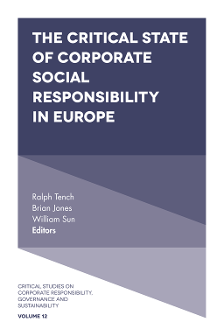
Index
The Critical State of Corporate Social Responsibility in Europe
ISBN: 978-1-78756-150-2, eISBN: 978-1-78756-149-6
ISSN: 2043-9059
Publication date: 19 July 2018
Citation
(2018), "Index", The Critical State of Corporate Social Responsibility in Europe (Critical Studies on Corporate Responsibility, Governance and Sustainability, Vol. 12), Emerald Publishing Limited, Leeds, pp. 343-358. https://doi.org/10.1108/S2043-905920180000012017
Publisher
:Emerald Publishing Limited
Copyright © 2018 Emerald Publishing Limited
INDEX
- Prelims
- Part I Introduction
- The Critical State of Corporate Social Responsibility in Europe: An Introduction
- Part II CSR Policies and Approaches at the EU and National Level: A Critical Review
- EU CSR Policy Co-Design: A Shopping Basket Voluntary Approach
- A Perspective from Corporate Governance: How CSR Is Approached by European Corporate Governance Codes
- Two Worlds Apart? Corporate Social Responsibility and Employment of People with Disabilities
- Active and Neutral Governmental Roles in the Context of Implicit Corporate Social Responsibility Model
- CSR in Germany: The Role of Public Policy
- The Reluctant State: A Failed Attempt to Develop a National CSR Policy
- Part III CSR Development in Europe: Contextual Differences and Understandings
- Transnational Corporate Social Responsibility: Fact, Fiction or Failure?
- Socio-cultural Differences in Understanding and Development of Corporate Social Responsibility in Germany and Croatia
- Part IV CSR Perceptions and Attitudes: Stakeholder Perspectives
- Challenging the Business Case Logic for Sustainability as an Instrument of CSR: Do Consumer Attitudes in Germany Support a Business Case?
- The MBA Student and CSR: A Case Study from a European Business School
- The Role of Business Schools in CSR and Responsible Management Education: The Polish Students’ Perspective
- Part V CSR Implementation in Organisations: Radical Changes and Challenges
- A Forgotten Issue: Fiscal Responsibility in the CSR Debate
- Corporate Social Responsibility of a French SME in the Transport Sector: Networking for Change
- Lessons on Frugal Eco-Innovation: More with Less in the European Business Context
- Requirements and Practices of Social Reporting in Italian Not-for-Profit Organisations
- CSR and Social Ontology: A Missing, but Necessary Link. Towards a Realist Account of the Firm
- Index